Talking With Tech AAC Podcast
Technology
Episodes
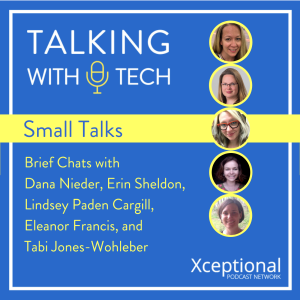
Tuesday Jan 01, 2019
Tuesday Jan 01, 2019
Happy New Year! This week, the TWT team would like to share five “Small Talks”, each 7 minutes or less, that we recorded with TWT guests Dana Nieder, Erin Sheldon, Lindsey Paden Cargill, Eleanor Francis, and Tabi Jones-Wohleber!
In our first Small Talk, Chris chats with Dana Nieder about her 21-day modeling challenge. Dana shares about how she helped people to stay on track with the challenge, gave people new ideas for modeling, and bringing the device along with the family!
Second, Erin Sheldon talks about what she learned listening to feedback from adult users of AAC. This included how to be a better speaking partner with AAC users, why finding out how an AAC user wants to communicate with you is so important, and the need for respecting the privacy of AAC users (e.g., asking permission to use their device, check their message history, etc).
Third, Lindsey Paden Cargill chats about things she does to generate language with students and make learning fun! Helicopter toys, balloons, spin art – Lindsey shares how she uses activities to engage and motivate her students to learn language!
Fourth, Eleanor Francis discusses how her school’s AAC users use the Square app to collect payment for their school’s coffee club! Her students are using the same app as stores use in the community, and the results have been great!
Finally, Tabi Jones-Wohleber talks about “Camp Gizmo”, a summer “camp” where parents, graduate students, and professionals learn hands-on how to help young children with multiple assistive technology needs!
We want to know what you think! You can connect with us at our Facebook group Talking with Tech, on Twitter, and Instagram (@talkingwithtech)! Also, please subscribe and post a review for us on iTunes- it helps others to find us!

Monday Dec 24, 2018
Monday Dec 24, 2018
Happy holidays from everyone here at the TWT team!
This week, join Rachel, Chris, Matt Hott of the SpeechScience podcast, and Mai Ling Chan of the Xceptional Leaders podcast as they gather for a special holiday episode!
These four podcast hosts tackle several “behind the scenes” questions about their podcasts, including: What is the hardest thing about being a podcast host? What is the dumbest thing you have said when recording? Why did you say “yes” to starting a podcast?
We hope you enjoy listening to this episode as much as we enjoyed making it!
We want to know what you think! You can connect with us at our Facebook group Talking with Tech, on Twitter, and Instagram (@talkingwithtech)! Also, please subscribe and post a review for us on iTunes- it helps others to find us!
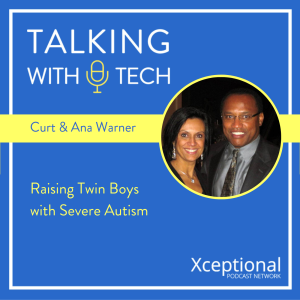
Tuesday Dec 18, 2018
Tuesday Dec 18, 2018
This week, the TWT team interviews Curt and Ana Warner! Curt and Ana are authors, presenters and the parents of four children, including two boys with autism.
Before the interview, Chris and Rachel discuss questions that Chris received during a recent assistive technology event, including: How can we hear more success stories from users? Where should we store large backups of AAC devices? Why is feature matching important? They also talk about Joy Zabala’s SETT framework (student, environment, task, tool) and how understanding problems through this framework can lead to more efficient and effective solutions.
Next, Rachel and Chris sit down for a touching and informative interview with Curt & Ana! Curt is a Former Pro Bowl NFL running back who played for the Seattle Seahawks and Los Angeles Rams. His wife, Ana, has dedicated her life to caring for her family and studying the treatment of autism.
In the interview, Curt & Ana discuss their experience parenting twins with severe autism, how judgment from others was so challenging when their children were young, and how they have stayed together through the ups and downs of parenthood. Curt & Ana share about dealing with complex communication needs, and how difficulty communicating may have caused self-injurious behavior. Finally, Curt & Ana share about the emotional highs and lows of parenting children with autism, and why acceptance and love are so important to them.
Curt & Ana’s book, The Warner Boys: Our Family's Story of Autism and Hope, is available now! For more information, visit bit.ly/thewarnerboys
We want to know what you think! You can connect with us at our Facebook group Talking with Tech, on Twitter, and Instagram (@talkingwithtech)! Also, please subscribe and post a review for us on iTunes - it helps others to find us!
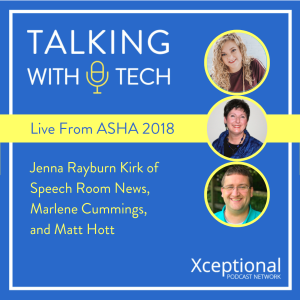
Tuesday Dec 11, 2018
Tuesday Dec 11, 2018
The TWT team is excited to bring you more interviews from ASHA - this week from Jenna Rayburn Kirk of Speech Room News, Marlene Cummings, and Matt Hott of the SpeechScience Podcast!
Before the interviews, you won’t want to miss Rachel and Chris’s discussion of coordination between school and private SLPs! What happens if there is disagreement about the best AAC solution? Why do we need to communicate and come to agreement about this? How can we collaborate more effectively? How can even parents be a roadblock to collaboration? Rachel and Chris cover solutions you can use right away to help coordinate better with your peers, including scheduling apps and feature matching meetings! They also discuss strategies for getting along with people we disagree with, such as finding something in his or her idea to validate.
Next, Rachel sits down at ASHA with the always entertaining Jenna Rayburn Kirk! Jenna and Rachel have a lively discussion about how ASHA has changed over the past few years, including an increased awareness of bloggers, increased utilization of social media, and more interest in online resources! Jenna also discusses why she thinks Teachers Pay Teachers has become so popular, and why services that provide clinicians with useful research, like The Informed SLP, are so important!
Following Jenna's interview, Rachel interviews Marlene Cummings, AAC specialist from Oakland Schools in Michigan! Marlene discusses why AAC specialists can’t be the “expert” any longer, and why it is so important for us to “share the wealth” of AAC with as many people as we can! Marlene shares a few ideas from her presentation, including supporting professionals directly in the classroom, coordinating teacher-directed vocabulary instruction, and more!
Finally, Matt Hott of the SpeechScience Podcast calls into ASHA to interview Rachel about her favorite parts of ASHA, and what her plans are for ASHA 2020 in Orlando!
We want to know what you think! You can connect with us at our Facebook group Talking with Tech, on Twitter, and Instagram (@talkingwithtech)! Also, please subscribe and post a review for us on iTunes - it helps others to find us!

Tuesday Dec 04, 2018
Tuesday Dec 04, 2018
This week, the TWT team presents three live interviews from ASHA with Jill Senner & Matt Baud, Meredith Poore Harold of The Informed SLP, and TWT listener Ashley!
Before the interviews, Rachel and Chris talk about all the great things that happened during Rachel's time speaking, connecting, and learning at ASHA 2018!
Next, we hear from Rachel’s interview at ASHA with Jill Senner & Matt Baud! They briefly discuss Jill & Matt’s talk on parent instruction and partner-augmented input with Kathleen Post, including the importance of pre-testing with video, why we need to move to a collaboration model, and things to get the ball rolling with AAC as a school-based SLP. Jill & Matt were kind enough to share the handouts from ASHA at www.talcaac.com!
For the second of Rachel’s interviews from ASHA, we hear from Meredith Poore Harold, owner of The Informed SLP! She talks about how The Informed SLP (theinformedslp.com) takes journal articles relevant to clinical practice and discusses why the article is important to know about and what the findings were. Meredith also teases a post on her site that details how to get a lot of different academic journal articles for free!
Finally, Ashley, an awesome TWT listener, asks Rachel some questions about AAC! These questions include when to incorporate core words on a new AAC user’s device, when “quick fire” phrases are (and are not) a good idea, and when we should introduce more grammatical morphemes as we model and recast!
We want to know what you think! You can connect with us at our Facebook group Talking with Tech, on Twitter, and Instagram (@talkingwithtech)! Also, please subscribe and post a review for us on iTunes- it helps others to find us!
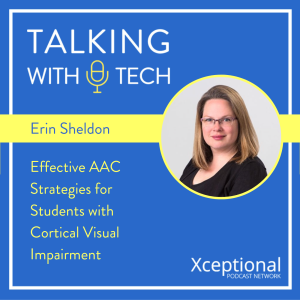
Tuesday Nov 27, 2018
Tuesday Nov 27, 2018
This week, the TWT team interviews Erin Sheldon, literacy and language development specialist for AssistiveWare and school inclusion consultant! Erin shares from her experiences working with visually-impaired AAC users, both professionally and as the parent of a teenager diagnosed with autism and Angelman Syndrome.
Before the interview, Rachel and Chris discuss some of their experiences with visual impairments and AAC, including teaching a student with CVI to communicate with visual & auditory scanning, using high-contrast images on AAC, teaching literacy using braille stickers, and the importance of AAC modeling with visually-impaired students!
Next, Erin shares about her daughter’s CVI, an impairment of the brain’s ability to process visual information. She discusses how they have taught her daughter to use a modified PODD system, and why it has been important that they have always presumed competence. Erin also shares about:
1. Why we “can’t hold a student’s language hostage to their vision” when implementing AAC.
2. Why moving to AAC more quickly can be very beneficial to language development, because children with CVI may understand symbols better than photographs.
3. What partner assisted scanning is, why it is so important for some users, and how it can help build a language foundation faster than when communication is only verbal.
4. What verbal referencing is, and why verbalizing what you understood from a person’s behavior can help improve language development.
5. Why making grids with too few icons OR too many icons can cause students with CVI to plateau.
6. Why we need to look what someone with can access, not just what he or she can see.
7. How to take advantage of colors that are easier to visually identify for some people with CVI, and how mentioning coloring during modeling can help the child connect the color and the icon.
8. How visually-distinct, high-contrast symbols can be effective for students with CVI.
9. Why maintaining the motor plan and icon location is so important for AAC users with CVI.
We want to know what you think! You can connect with us at our Facebook group Talking with Tech, on Twitter, and Instagram (@talkingwithtech)! Also, please subscribe and post a review for us on iTunes- it helps others to find us!
For more links, information, and resources from this episode, visit our podcast page at bit.ly/twtpodcast
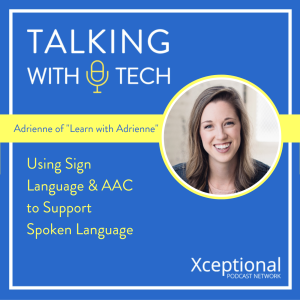
Tuesday Nov 20, 2018
Tuesday Nov 20, 2018
This week, TWT interviews Adrienne of “Learn with Adrienne”, an SLP who specializes in early intervention. Through online videos, she has taught thousands of people how to use sign language to support a child’s language development. She and Rachel discuss several topics, including how sign language and high-tech AAC can be used as part of a multi-modal approach!
Before the interview, Chris and Rachel talk about motivation and why it is such an important part of any intervention. Rachel shares a personal story about a difficult conversation she had with a peer, and why it is important not to be too hard on ourselves when there is a breakdown in communication. Rachel also talks about why we should “inspire not require” our students to communicate, and why placing repeated demands can be so disruptive to progress. Finally, Chris asks why we can't have an AAC course in high school or college - maybe even one that satisfies a language credit!
Next, Rachel interviews Adrienne! They discuss:
1) How Adrienne became interested in early intervention and sign language,
2) How research indicates that learning sign language doesn’t limit spoken language growth,
3) Why teaching sign language can help a child receive more positive feedback,
4) Why it can be helpful to teach students more than one communication modality - e.g., teach both sign language and high-tech AAC devices as needed, and
5) How we should receive an approximation of a sign when a child has their own way signing something!
We want to know what you think! You can connect with us at our Facebook group Talking with Tech, on Twitter, and Instagram (@talkingwithtech)! Also, please subscribe and post a review for us on iTunes- it helps others to find us!

Tuesday Nov 13, 2018
Tuesday Nov 13, 2018
This week, TWT interviews Jenna Rayburn Kirk, the ultra-creative school-based SLP, blogger, and TPT contributor! Jenna shares about how she got started creating resources, the kinds of AAC resources and materials that she thinks are effective, and how she continues to try and create resources that people really need! Before the interview, Chris and Rachel discuss their own experiences with making materials and, in Rachel’s case, why she recently decided to create a Teachers Pay Teachers page. Rachel and Chris also talk about some apps that they have used recently in therapy, including Choice Works and AR Dragon. Finally, Chris discusses “core kits,” a low-tech core vocabulary strategy that could save the day when you need a quick therapy idea.
Next, Rachel interviews Jenna Rayburn Kirk! Jenna talks about how she juggles being a full-time school SLP, AAC specialist, and an entrepreneur; why she is motivated to share her ideas; and how she has gotten to be so popular (over 25,000 followers) on Teachers Pay Teachers! Jenna covers useful topics in AAC and materials creation, including:
1) Why parent handouts are such an effective way to improve AAC implementation at home
2) Why it is helpful to be specific about how to get modeling and working on core vocabulary
3) Why we need to be flexible in how we approach asking for help from the circle of support
4) Why getting buy-in from someone is easier when you show them how you are solving a problem they have.
5) Why it is so important to build strong relationships with teachers, caregivers, and parents
6) Why some students need a “short term” assistive technology plan; not everyone who needs AAC needs it for years.
7) How a school can fill the gap between identification of an AAC need and getting a device funded by having devices available to everyone in the classroom.
8) Why “waiting for words” can delay language too much, because “there is no reason to stunt expressive language while we wait for speech sounds.”
To learn more about Jenna & get access to her TPT store, visit https://thespeechroomnews.com.
For access two free resources from Rachel and the Building Sentences board discussed on the podcast, visit http://bit.ly/RachelMadelTPT
We want to know what you think! You can connect with us at our Facebook group Talking with Tech, on Twitter, and Instagram (@talkingwithtech)! Also, please subscribe and post a review for us on iTunes- it helps others to find us!

Tuesday Nov 06, 2018
Tuesday Nov 06, 2018
This week, TWT interviews Dana Nieder about her journey as an advocate, writer, AAC specialist, speech-language pathologist, and AAC mom! Dana shares about how she always presumed her daughter’s potential, why she shared about her experiences on blogs and social media, and what her many experiences have taught her about AAC! Dana shares many helpful insights, including:
How to deal with members of the circle of support who believe that an AAC user must “prove” they can use a high-tech device before one is provided to them;
Why parents can be such valuable resources and why they are such a key part of any successful intervention;
Why everyone in the circle of support needs to believe an AAC intervention will be successful;
Why we must presume that people with complex communication needs have the potential to succeed;
How to "invest" in an AAC user's circle of support, and why their buy-in and motivation is critical to success;
Why we need to change how we support AAC depending upon both a person's role and his or her comfort level with AAC;
Why we should share AAC modeling videos with people who are unfamiliar with modeling on an AAC device;
Why watching a video of a successful adult AAC user can be so motivating to the circle of support;
and much more!
We want to know what you think! You can connect with us at our Facebook group Talking with Tech, on Twitter, and Instagram (@talkingwithtech)! Also, please subscribe and post a review for us on iTunes- it helps others to find us!
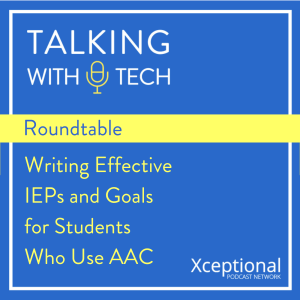
Tuesday Oct 30, 2018
Tuesday Oct 30, 2018
Join the TWT team this week for a roundtable discussion about writing Individualized Education Plan (IEP) goals for students with complex communication needs (CCN). Topics discussed in this roundtable include:
Why augmentative and alternative communication (AAC) devices should be used in early intervention and not just as an ‘intervention of last resort” for students with CCN.
Using the accommodations section to detail what the student needs as part of his or her free appropriate public education.
Adding minutes for coaching the circle of support about AAC on the IEP as a “related service” instead of a “direct service”
Why listing a specific system or app in the IEP can cause problems, and how those problems can be avoided by describing, rather than naming, the system.
Why accessories for AAC devices (keyguard, switches) should be included in the IEP.
Why new training goals may be important when there is a major change in the circle of support.
Why being specific about what you are going to measure in a goal is critical when you are measuring it later.
The need to go beyond requesting when writing goals - include commenting protesting, asking questions, etc.
AAC therapy is language therapy - in many cases you don’t even need to mention the system or app when writing a language goal
Who should be responsible for an AAC-related goal on the IEP?
We want to know what you think! You can connect with us at our Facebook group Talking with Tech, on Twitter, and Instagram (@talkingwithtech)! Also, please subscribe and post a review for us on iTunes- it helps others to find us!